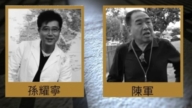【新唐人2012年9月21日讯】中共喉舌《人民日报》宣称“60后”省部级官员,渐成中国政坛上的一道“亮丽风景”,并大加吹捧“60后”将影响中国的未来。但民众并不买账,有网友说:把国家的希望寄托在几个官员身上,是一种可怕的思维,也是一种最没有希望的希望;应该用真正的民主产生领导人,这才是中国的希望所在!
9月20号《人民日报》海外版刊文声称,现任“60后”省部级领导干部“年轻、高学历、有实践经验、有人文社科背景”,在未来他们不仅对中国的“地方治理”和“执政风格”产生影响,而且他们将影响未来中国的走向与命运。
文章统计,现任“60后”省部级领导干部共有161位,其中省委常委118位。文章盘点了7名“60后”省部级正职官员的履历。
外界分析,从这7名官员的履历来看,他们有个共同点,就是:有共青团工作经验。分析说,胡锦涛的团派已占据绝对优势,将在“十八大”后主导大局。
文章同时还指出,社会对“60后”省部级高官有高度的期待。原因是:人们对于目前社会发展中出现的有些问题存有困惑,新的政治人物的出现给他们一种希望、期待。
对此,加拿大大温哥华地区时事评论员刘淇昆表示,把希望寄托在中共的一部分官员身上,最后结果只能是失望。
时事评论员 刘淇昆:“中国的前途不在于党内改革派今后…怎么会在体制内进行改革,没有这种希望,中国的前途不在这里,简单的讲 ‘人民革命’,中共独裁专制的体制是需要被推翻,被打倒的,而不是去进行改良,而不是去依靠党内的高层的一部分当权派,去进行改良。”
旅居澳洲的前国策顾问邱垂亮则表示,中国目前的局面,不管是“60后”还是“70后”、“80后”也好,只要都在体制内存在,谁都救不了中国。
前国策顾问 邱垂亮:“我可举个例子,就是从美国西方训练出来的这些学者,从政的包括现在外长杨洁篪这种人,看起来应该是蛮会能够带领中国新的想法、新的做法,但是杨洁篪一进去那个体制里面,就被那体制限制了,这些人怎么样改造这个庞大的、蛮僵硬的、专制的中国,我认为还是不很乐观。”
文章说,对于官员来说,新的大挑战来自“舆论环境”之变。微博等新兴媒体崛起,让官员“无处藏身”,民众互通互联“瞬间完成”。而新的五到十年,“表哥”事件会越来越多。如果,再遇到“PX事件”、“甚邡事件”,60后省部高官或下属们,将如何处理,将是严重的考验。
一年前,胡锦涛在中共建党90周年纪念日的讲话中,曾提到中共正面临四个危险,就是:精神懈怠的危险,能力不足的危险,脱离群众的危险,和消极腐败的危险。而《人民日报》当时刊发胡锦涛七一建党讲话,只字未提“四个危险”。
一年多以后,《人民日报》除了再次提出“四个危险”,同时还指出:中共面临四种考验,也就是:执政考验、改革开放考验、市场经济考验、外部环境考验。文章表示,“60后”省部高官无法回避这些考验。
而对于《人民日报》盘点7名60后省部级官员,对他们寄予期望,网友却不买账。
有网友说:真希望不要再搞这小圈钦点了,应该用真正的民主产生领导人,这才是中国的希望所在!
也有网友感叹,把一个国家的希望寄托在几个官员身上,是一种可怕的思维,是一种最没有希望的希望。
采访编辑/常春 后制/薛莉
People Reject CCP Praise for 1960 Generation Officials
CCP state media People’s Daily reported that many people
born in the 1960s became provincial and ministerial level officials, and that they will now affect the future of China.
The Chinese public, however,
have refuted this proclamation.
They said that it is indeed hopeless to count
on several officials for the future of China.
China’s future lies in a democratic way of selecting officials.
On Sept. 20, the overseas edition
of People’s Daily published an article.
It stated that Chinese officials born in the 1960s
are “young, well-educated, and experienced.
They have degrees in humanities and the social sciences.”
It also said that these officials will not only change China’s
administration style, but will also affect China’s future.
The article’s statistics show that there are currently 161
provincial and ministerial level officials born in 1960s.
118 of them are serving as Standing Committee
members, and the article lists 7 officials’ experiences.
The 7 officials share one experience,
that is working in Communist Youth League.
Some analysts say that the Hu Jintao
faction has taken absolute dominance.
It will take real power after the 18th National Congress.
The article also states that the high expectations of these
officials comes from the dissatisfaction of the current society.
New officials will bring people hope and new expectations.
Canadian critic Liu Qikun said that if people place their hope
on some CCP officials, they are sure to be disappointed.
Political critic Liu Qikun: “China’s future does
not lie within the reform of the Party itself.
How can there be reforms within the current political system?
The CCP dictatorship should be
overthrown, and not be renovated.
We cannot count on some CCP officials to reform this Party.”
Former national policy consultant Qiu Chuiliang said China’s
current problems cannot be solved by a certain generation.
They can do nothing as long as they stay in the system.
Qiu Chuiliang: “I can give an example. China’s current
Foreign Minister Yang Jiechi studied in the U.S.
Once within the CCP system, he was constrained by it.
How can we expect these people to transform this rigid
and authoritarian China? I am personally not very optimistic.”
The article said officials face new challenges from the public.
The rise of new media such as a microblogs
leaves the officials “nowhere to hide."
People can “instantaneously" communicate with each other.
The coming decade will see more cases like those
of previous official, whose corruption was revealed by reports of the many expensive watches he wears.
Public protests against pollution from paraxyline chemical
plants, or the refinery plants in Shifang, will pose serious challenges to CCP officials born in the 1960s.
At the CCP’s 90th anniversary a year ago,
Hu Jintao referred to CCP’s four threats.
Slackened spirit, incapability,
isolation from the people, and corruption.
People’s Daily published Hu’s speech without the fours threats.
Now People’s Daily brings up not only
the “four threats”, but also “four challenges”.
Tests of its administration, opening up and reform,
a market economy, and tests from the external environment.
The article said the 1960-generation
officials cannot avoid these tests.
Chinese netizens refuse the lay their hopes
on the 7 officials that the People’s Daily introduced.
One netizen said, “I wish they could stop
the behind closed doors way of choosing officials.
China’s future lies in a democratic way of selecting officials.”
Others said it is hopeless when a country places its future
upon a few officials, which is a disconcerting way of thinking.




























